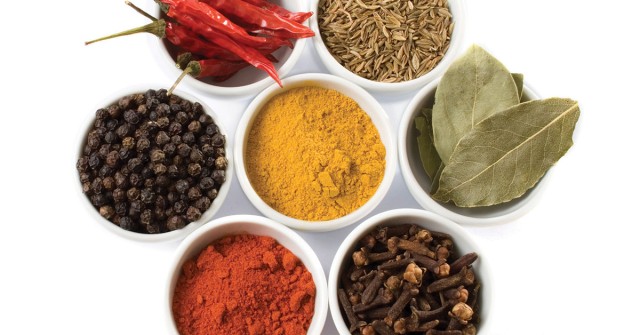The Fantastic Superpowers of Coconut Oil

From cooking to cozying up with your sweetheart, coconut oil is all the rage. If you’re ready to take coconut oil to the next level in your daily life, here are some recommendations drawn from the teachings of Ayurveda.
First, here’s a short list of some of the excellent health benefits of coconut oil:
- Protects the sensitive lining of your small and large intestine
- Promotes heart health, when eaten with a whole-foods, plant-based diet
- Supports a strong immune system because it is antibacterial, antifungal, and antiviral
- Helps balance metabolism
- Provides energy and endurance
- Great for memory and brain function
- Reduces inflammation, including gum inflammation, and the inflammation associated with arthritis
- Moisturizes your skin, when used both internally and externally—think “fountain of youth”!
Coconut Oil in the Kitchen
In combination with a whole-foods diet—including lots of fruits, whole grains, legumes, and veggies—coconut oil is an excellent source of medium- and short-chained fatty acids, which combat inflammation and keep your microbiome healthy and happy.
I’m a big fan of cooking with coconut oil, but because I live in New England and it is cold or cool here for nine months of the year, I tend to use coconut oil only in the warmest weeks of summer, when the oil liquefies (which happens at 76 degrees Fahrenheit). Coconut oil has a cooling effect and I tend to run cold, so it’s not ideal for me in cooler weather. If you tend to run chilly, too, favor coconut oil in the warm months only. But if you’re a hot type—the one wearing a tank top and shorts when it’s just a few degrees above freezing—you might want to use coconut oil year round. And for those of you who live in more tropical climates, this could be your everyday oil of choice.
New to cooking with coconut oil? Here are some suggestions.
- Use it for frying eggs, potatoes, and pancakes.
- Sauté your veggies in it—coconut oil has a high smoking point, meaning it won’t create cancer-causing free radicals when you sauté with it.
- Toss vegetables in coconut oil instead of olive oil before roasting.
- Use it when toasting your homemade granola in the oven.
- Up-level your coffee: Skip the half-and-half and use coconut oil instead. Put the coffee and 1 to 3 teaspoons of coconut oil in the blender, and whirl until frothy.
Self-Massage with Coconut Oil
The classical Ayurvedic texts tout the benefits of abhyanga, self-massage with oil. Here’s what the 2,500-year-old Charaka Samhita says about abhyanga: “Of the one who practices oil massage regularly, the body—even if subjected to injuries or strenuous work—is not much injured; [their] physique is smooth, ... strong, and charming. By applying oil massage regularly, the onslaught of aging is slackened.”
Science shows that about 65 percent of every substance you put on your skin is absorbed into the bloodstream. Ayurveda suggests not putting anything on your skin that you wouldn’t eat. So you can feel good about putting coconut oil on your skin.
Since coconut oil is cooling, it’s best for self-massage during the summer months, in warm climates, or if you’re someone who tends to be hot all the time. If you are a cold type, use sesame oil, which is warming. If you are a cold type but you like coconut oil, you can mix it with sesame oil in the summer. That way, it will be a bit cooling and a bit warming. Added benefit: The warmth of the sesame oil keeps the coconut oil liquid.
There are two ways to oil your skin—a balancing, deep-tissue massage and the shower-moisturizing method.
Deep-Tissue Massage
Plan to spend about 30 minutes for the massage. Find a warm room or put a space heater in your bathroom to warm it up. Lay out a towel on the floor or on a chair. Put ½ cup of coconut oil in a small jar, and place the jar in a bath of hot water to liquefy and warm the oil.
For the head:
- Start with the hair. Rub a small amount of oil into the scalp, and massage all the way through the hair.
- Massage the face, ears, and neck.
For the upper body:
- Use circles at the shoulder joints, long strokes on the upper arm, circles on the elbows, long strokes on the lower arms, and circles on the wrists. Massage hands and fingers.
- Massage the breasts/chest and belly in circles.
- Use up-and-down strokes from the armpits to the hips.
- Do a circular massage on the low back.
For the lower body:
- Use circles at the hips, long strokes on the upper legs, circles on the knees, long strokes on the lower legs, and circles on the ankles.
- Massage the feet and toes.
Finish by lying down or sitting quietly for a few minutes. Then take a warm shower, allowing the oil to soak into the arms, legs, face, and torso.
Abhyanga in the Shower
If you want to keep your skin moisturized but don’t have time every day for a deep-tissue massage, do abhyanga in the shower. Keep a squeeze bottle or jar of coconut oil in the shower in the warmer months. After you have soaped your body, do a shorter version (three to five minutes) of the massage described above. Pat dry. Your skin will feel amazing. Once the cold weather starts, switch out the coconut oil for warming sesame oil.
Sexy Time
Let’s get down to it. Here is where coconut oil really shines. Coconut oil is par excellence for providing lubrication during sexual intimacy. Now, skip it if you are using condoms, as the oil will degrade the latex and defeat the whole intention of using protection. But, for those of you who are practicing safe sex without condoms, coconut oil is the sexy oil of choice.
According to Ayurveda, women’s reproductive organs are warm and men’s are cooling in nature; biologically, women keep warm to grow a baby and men need to keep cool to protect their sperm. Coconut oil protects both from overheating, while providing safe, all-natural lubrication. (Lubricants and oils of any type may affect your balance of bacteria, so stay attuned to your body and what it likes.)
For women who are nearing or in menopause and experiencing dryness, coconut oil may be your answer. You can massage your reproductive organs with coconut oil daily. You can also liquefy coconut oil and dip cotton tampons (without applicators) in the oil. Place on a dish in the refrigerator to cool. Use once a day, three times a week, for 30 minutes, for internal lubrication.
Remember, coconut oil is best used in hot climates, in the hot summer months or for hot body types. Whether you use it for breakfast, a massage, between the sheets, or all three, make sure you always have a jar of coconut oil close at hand!
Erin Casperson, Lead Kripalu Faculty and Director of the Kripalu School of Ayurveda, is passionate about sharing how the ancient practices of Ayurveda can be applied to modern-day living.
Full Bio and Programs